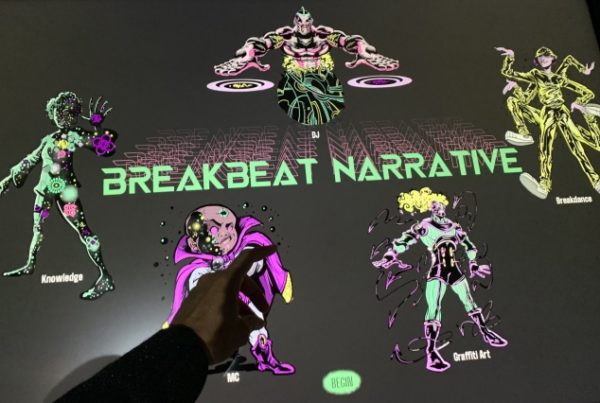Abstract
Chimeria: Gatekeeper is a playable interactive conversational scenario, authored using the Chimeria Platform It uses a cognitive science-grounded model of social category membership to customize how conversational narratives unfold. Conversations between characters are important aspects of many videogames. However, most such conversational interactions in videogames are quite limited in how they take into account the identities of those characters. Conversation in videogames typically varies, if at all, based only on one aspect of the character such as an NPC referring to the character by race, class, or a gendered pronoun. Chimeria: Gatekeeper is an application of the Chimeria Platform, which seeks to developing conversational narratives that addresses such limitations.
DESCRIPTION
The Chimeria Platform was developed as a part of the NSF- funded Advanced Identity Representation (AIR) Project discussed. The platform has the ability to computationally represent multiple kinds of categorization phenomena as described in sociolinguistics, cognitive linguistics, and the sociology of classification. Chimeria:Gatekeeper models an extremely common RPG scenario – a player trying to get past an NPC guard in order to gain access to the inside of a castle keep. However, within this application, the Chimeria Engine is used to enhance this scenario by modeling more complex, adaptive, and nuanced conversations between the player character (PC) and the non-playable characters (NPCs).
THEORETICAL FRAMEWORK
COGNITIVE CATEGORIZATION
The Chimeria Engine implements an AI-based system and is grounded in cognitive science theories of categorization, which implements an algorithmic model of users’ degrees of membership in multiple categories. Furthermore, the Chimeria Engine is responsible for the generation of non-linear, socio-linguistic based conversational narratives to be experienced by users. The notion of category gradience implemented in Chimeria is based upon cognitive scientist George Lakoff’s work in cognitive categorization. Lakoff’s notion of centrality gradience recognizes that some members are typically deemed “better examples” of a category than others, what psychologist Eleanor Rosch has called “prototypes.” Centrality gradience describes how “members which are clearly within the category boundaries may still be more or less central”. Within the sociology of science, Geoffrey Bowker and Susan Leigh Star have argued that classification systems entail a process of regular- ization that occurs across different contexts. We use concepts of category membership such as:
- Membership: the experience of encountering and interacting with objects within certain social groups, and increasingly engaging in naturalized relationships with them,
- Naturalization: is the deepening familiarity of such interactions within a given social group.
- Marginalization is a result of enforced naturalization occurring in which members of a marginal category exist outside of social groups, or are less prototypical members of communities. It is also characterized by exclusion from a social group or an individual having multiple memberships and having to switch between the objects, interactions and protocols specific to each social group.
SOCIOLOGY OF STIGMA
Drawing on Goffman’s theories of stigma, the PC is initialized to the ‘discredited’ category and the NPC to the ‘accepted’ category. The accepted category is instantiated with a concrete category that is prototypically defined as the Brushwoods race – short, plain-spoken, and wearers of rough spun clothing. The discredited category has been instantiated with a concrete category that is prototypically defined as the Sylvanns race – tall, well-spoken, and wearers of fine clothing. To gain access to the inside of the keep, the player has to convince the guard that she or he is among the accepted category, in effect “passing” as a member of the concrete category has been instantiated as “Accepted”.
RELATED PUBLICATIONS
Harrell, D. F., Kao, D., Lim, C., Lipshin, J., Sutherland, A., Makivic, J., & Olson, D. (2014). Authoring conversational narratives in games with the Chimeria platform. In Proceedings of the 9th Annual Conference on Foundations of Digital Games (FDG2014). Harrell, D. F., Kao, D., Lim, C., Lipshin, J., Sutherland, A., & Makivic, J., (2014). The Chimeria Platform: An Intelligent Narrative System for Modeling Social Identity-Related Experiences. In Proceedings of the 7th workshop on Intelligent Narrative Technologies (INT7). Harrell, D. F., Kao, D., Lim, C., Lipshin, J., & Sutherland, A. (2014). The Chimeria Platform: User Empowerment through Expressing Social Group Membership Phenomena. In Proceedings of the 2014 Digital Humanities Conference (DH2014).
http://groups.csail.mit.edu/icelab/content/chimeria-gatekeeper-0




